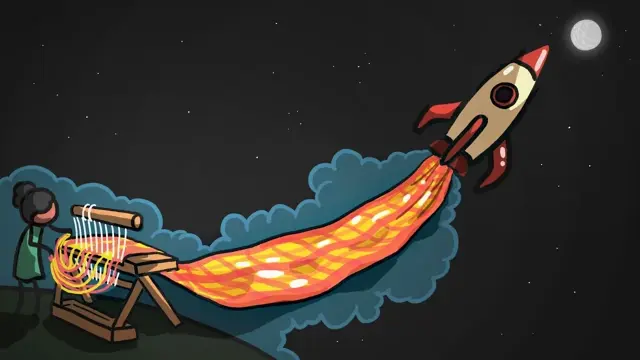2025-08-27
[public] 37.7K views, 4.58K likes, dislikes audio only
In the 1960s, NASA’s engineers were building the Apollo spacecraft. But they ran into a major problem that almost prevented them from getting to the moon. To solve it, they brought in some unexpected help: expert weavers.
LEARN MORE
**************
To learn more about this topic, start your googling with these keywords:
- Core Rope Memory: a type of read-only memory (ROM) that was used in the Apollo Guidance Computer (AGC).
- Transdisciplinary: an approach that integrates knowledge and perspectives from various disciplines and sectors, including non-academic stakeholders, to address complex real-world problems.
SUPPORT MINUTEEARTH
**************************
If you like what we do, you can help us!:
- Become our patron: https://patreon.com/MinuteEarth
- Our merch: http://dftba.com/minuteearth
- Our book: https://minuteearth.com/books
- Sign up to our newsletter: http://news.minuteearth.com
- Share this video with your friends and family
- Leave us a comment (we read them!)
CREDITS
*********
Cameron Duke | Script Writer & Narrator
David Goldenberg | Director
Sarah Berman | Illustration, Video Editing and Animation
Nathaniel Schroeder | Music
MinuteEarth is produced by Neptune Studios LLC
OUR STAFF
************
Lizah van der Aart • Sarah Berman • Cameron Duke
Arcadi Garcia i Rius • David Goldenberg • Melissa Hayes
Henry Reich • Ever Salazar • Leonardo Souza • Kate Yoshida
OTHER CREDITS
*****************
Examples of lidar snapshot returns. Figure by Falk Feddersen, et. al. https://doi.org/10.1017/jfm.2023.40
Needleworker weaving core rope memory. Raytheon Public Relations, courtesy of the collection of David Meerman Scott.
Core rope memory from the Apollo Guidance Computer. https://commons.wikimedia.org/wiki/File:Agc_rope.jpg
OUR LINKS
************
Youtube | https://youtube.com/MinuteEarth
TikTok | https://tiktok.com/@minuteearth
Twitter | https://twitter.com/MinuteEarth
Instagram | https://instagram.com/minute_earth
Facebook | https://facebook.com/Minuteearth
Website | https://minuteearth.com
Apple Podcasts| https://podcasts.apple.com/us/podcast/minuteearth/id649211176
REFERENCES
**************
Apollo Press Kit. https://archive.computerhistory.org/resources/access/text/2017/01/102770254-05-01-acc.pdf
Core Memory Weavers and Navajo Women Made the Apollo Missions Possible. 18 Feb. 2022, https://www.sciencenews.org/article/core-memory-weavers-navajo-apollo-raytheon-computer-nasa
“From Dairy Cultures to Dazzling Technology | Harvard Medical School.” Hms.harvard.edu, 20 Oct. 2016, hms.harvard.edu/news/dairy-cultures-dazzling-technology.
Ren, Jingjing, et al. “Dynamics and Characteristics of Interdisciplinary Research in Scientific Breakthroughs: Case Studies of Nobel-Winning Research in the Past 120 Years.” Scientometrics, vol. 128, no. 8, 22 June 2023, pp. 4383–4419, https://doi.org/10.1007/s11192-023-04762-x
Romano, Noemi, et al. “Linguistic Traits as Heritable Units? Spatial Bayesian Clustering Reveals Swiss German Dialect Regions.” Journal of Linguistic Geography, vol. 10, no. 1, Apr. 2022, pp. 11–22, https://doi.org/10.1017/jlg.2021.12
Seeman, Jeffrey Ira, and Guillermo Restrepo. “The Mutation of the “Nobel Prize in Chemistry” into the “Nobel Prize in Chemistry or Life Sciences”: Several Decades of Transparent and Opaque Evidence of Change within the Nobel Prize Program.” Angewandte Chemie International Edition, 4 Dec. 2019, https://doi.org/10.1002/anie.201906266
Sullivan, Bill. “Gene’s Addiction, or Why Ozzy Osbourne Is Still Alive.” Discover Magazine, https://www.discovermagazine.com/health/genes-addiction-or-why-ozzy-osbourne-is-still-alive
Uzzi, B., et al. “Atypical Combinations and Scientific Impact.” Science, vol. 342, no. 6157, 24 Oct. 2013, pp. 468–472, https://doi.org/10.1126/science.1240474
https://patreon.com/minuteearth
/youtube/video/cQPopMSfxTQ

